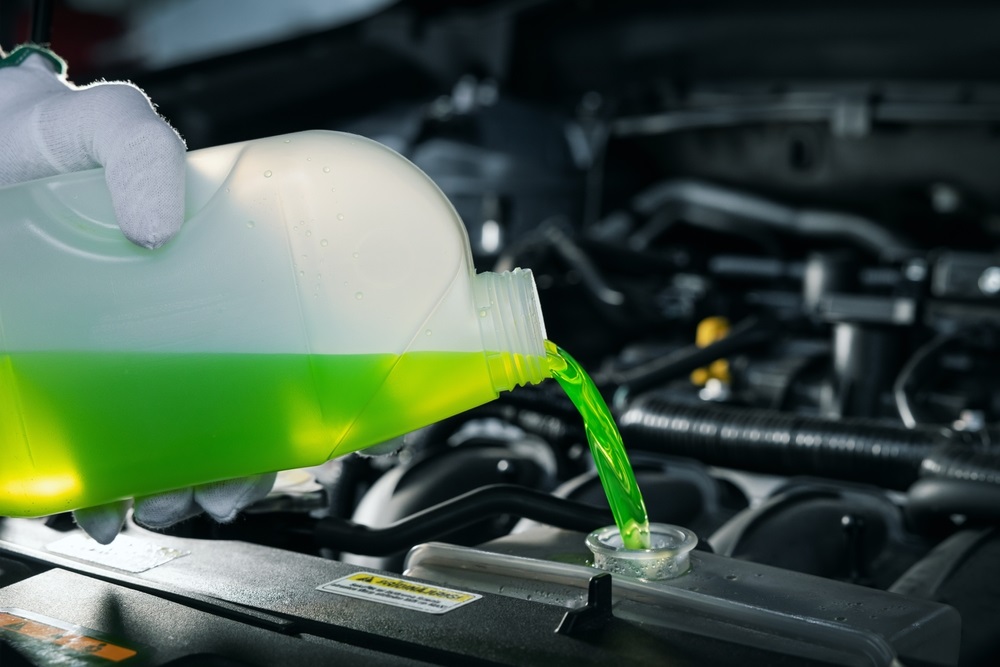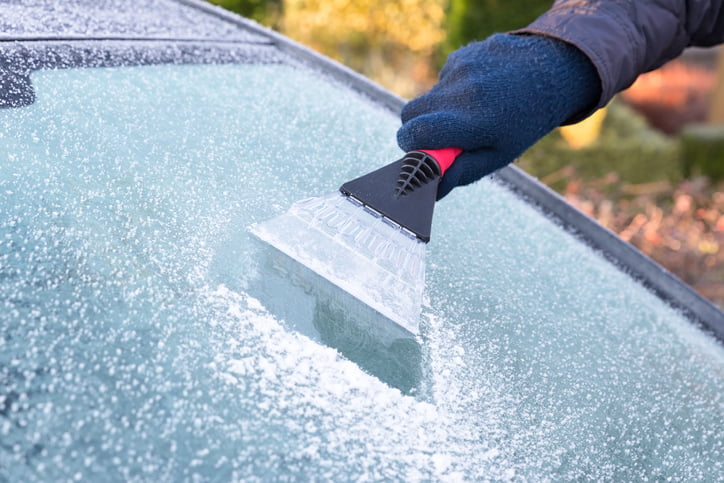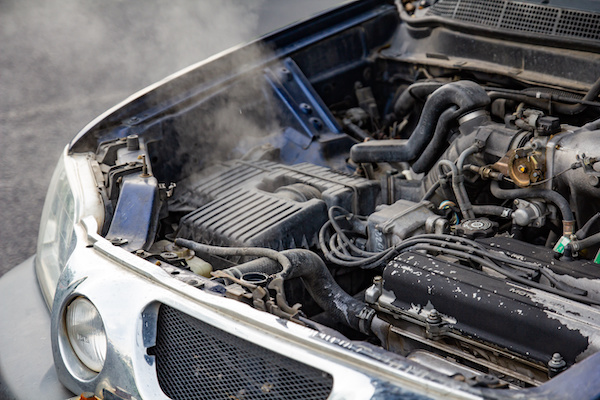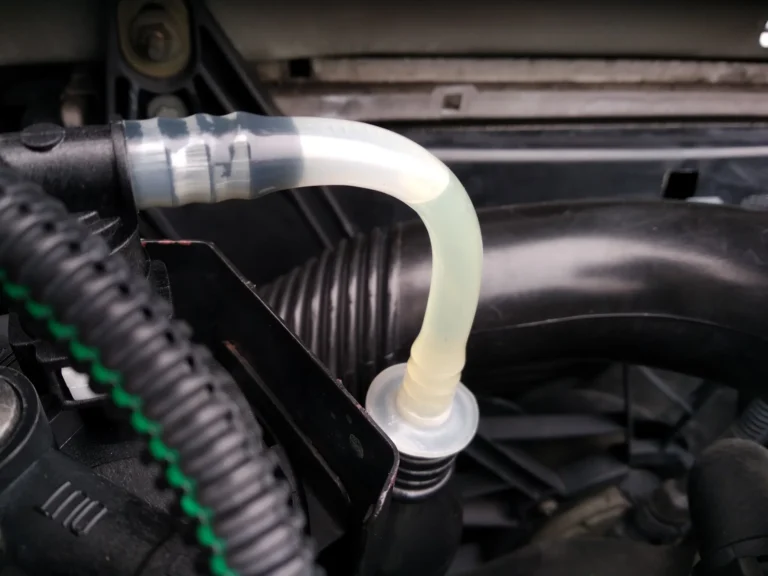Can You Put Antifreeze in Screenwash?
No, it’s not recommended to put antifreeze in your windshield washer reservoir as a substitute for windshield washer fluid. Antifreeze is specifically designed to regulate the freezing and boiling points of the engine coolant to protect the engine from extreme temperatures.
Using antifreeze in the windshield washer system can cause damage to the system components and harm your vehicle’s paint and windshield. Antifreeze is not formulated for cleaning purposes and may leave streaks or residues on the windshield, affecting visibility and potentially damaging the wiper blades.
Windshield washer fluid contains cleaning agents designed to remove dirt, grime, and other debris from the windshield without causing damage. It also has a specific composition to prevent freezing in cold temperatures.
What’s in Washer Fluid & How Does it Prevent Freezing?

Washer fluid, also known as windshield washer fluid or screen wash, is a liquid used in vehicles to clean windshields and headlights. It serves as a cleaning agent to remove dirt, grime, insects, and other debris from the windshield to maintain visibility while driving. The fluid is a mixture of water and various additives that aid in its cleaning properties and prevent freezing.
The composition of washer fluid typically includes
Water
It forms the base of the fluid and serves as the solvent for other ingredients. Distilled water is often used to prevent mineral deposits that could obstruct the washer system.
Detergents
These are surfactants added to dissolve and remove dirt, grease, and other contaminants from the windshield effectively.
Solvents
Alcohol, usually methanol or ethanol, is commonly added to lower the freezing point of the mixture. It helps prevent the fluid from freezing in colder temperatures.
Fragrances or dyes
Some washer fluids might contain fragrances for a pleasant smell or dyes for coloration, although these components are optional and not essential for the fluid’s functionality.
The prevention of freezing is a crucial aspect of washer fluid, especially in colder climates. The inclusion of alcohol-based solvents, such as methanol or ethanol, lowers the freezing point of the fluid. Water alone freezes at 0 degrees Celsius (32 degrees Fahrenheit), but the addition of alcohol reduces this freezing point significantly, depending on the concentration of alcohol in the mixture.
By lowering the freezing point, the washer fluid remains in a liquid state even at below-freezing temperatures, preventing it from turning into ice inside the reservoir, hoses, or nozzles. This ensures that the windshield washer system remains operational in cold weather, allowing drivers to effectively clean their windshields despite freezing temperatures.
How Does Antifreeze Work in Vehicles & What’s in its Composition?

Antifreeze, also known as coolant, plays a critical role in the cooling system of vehicles, preventing the engine from freezing in cold temperatures and overheating in hot conditions. It is a specialized fluid that circulates through the engine and radiator, absorbing excess heat from the engine and dissipating it through the radiator to maintain an optimal operating temperature. Antifreeze is typically a mixture of water and various additives.
The composition of typical antifreeze consists of
Ethylene Glycol or Propylene Glycol
These are the primary ingredients in most antifreeze formulations. Ethylene glycol has been traditionally used in antifreeze, while propylene glycol is a less toxic alternative. These chemicals have high boiling points and low freezing points, making them effective in preventing both freezing and boiling of the engine coolant.
Water
Water is mixed with the glycol base to form the bulk of the coolant solution. It acts as a carrier for the glycol and aids in transferring heat away from the engine.
Corrosion Inhibitors
Antifreeze contains additives that protect the metal components of the engine’s cooling system from corrosion and rust. These inhibitors prevent the formation of scale and deposits that could impede the flow of coolant and reduce the cooling system’s efficiency.
Lubricants and Dye
Some antifreeze formulations may also include lubricants to maintain the smooth operation of the water pump and dyes to distinguish different types or colors of antifreeze.
The function of antifreeze in a vehicle’s cooling system is twofold
Freezing Point Depression
The addition of ethylene glycol or propylene glycol to water lowers its freezing point significantly. This prevents the coolant from freezing in cold temperatures, ensuring that it remains in a liquid state and allowing the engine to operate without damage caused by ice formation within the cooling system.
Boiling Point Elevation
Antifreeze raises the boiling point of the coolant, enabling it to withstand higher temperatures without evaporating. This is crucial in preventing the engine from overheating, especially during periods of heavy use or in hot weather conditions.
The proper mixture of antifreeze and water is essential for optimal performance. The recommended ratio varies depending on the type of antifreeze used and the climate. Generally, a 50/50 mixture of antifreeze and water provides adequate freeze protection down to around -34 degrees Celsius (-29 degrees Fahrenheit) while also providing sufficient boil-over protection.
What Risks Exist in Using Antifreeze for Washer Fluid & How Does it Cause Damage?
Using antifreeze as a substitute for washer fluid can pose several risks and potential damages to a vehicle’s components. While both antifreeze and washer fluid serve different purposes and contain different ingredients, the main concerns when using antifreeze in the washer fluid reservoir include visibility issues, potential damage to paint and rubber components, environmental and health hazards, operational problems, and potential regulatory issues.
Antifreeze lacks the specific detergents and cleaning agents found in washer fluid, leading to poor windshield cleaning and potential visibility impairment. Moreover, its chemical composition can harm the vehicle’s paint, rubber seals, hoses, and other washer system components. Additionally, antifreeze contains toxic substances like ethylene glycol, posing risks to the environment, animals, and humans if leaked or improperly disposed of. It may also cause operational issues and could potentially violate local regulations regarding fluid usage in vehicles.
It’s crucial to use the right fluid for each specific purpose in a vehicle to ensure optimal performance, safety, and longevity of its components. If antifreeze has been mistakenly added to the washer fluid system, it’s essential to drain and flush the system thoroughly and refill it with the appropriate washer fluid to prevent potential damage and ensure safe and effective operation.
FAQ’s
Is antifreeze the same as windscreen wash?
No, antifreeze and windscreen wash are different products used for distinct purposes in a vehicle. Antifreeze regulates engine temperature, while windscreen wash is for cleaning the windshield.
What is a good substitute for windscreen fluid?
A suitable substitute for windscreen fluid can be a mixture of water and vinegar or water with a small amount of dish soap. However, it’s recommended to use proper windscreen fluid for optimal cleaning.
What is the difference between coolant and antifreeze?
Coolant is a mixture of antifreeze and water used in a vehicle’s cooling system. Antifreeze is a component of coolant that prevents freezing and helps regulate the engine’s temperature.
Where do you put antifreeze?
Antifreeze is typically poured into the vehicle’s radiator or the coolant reservoir to maintain the proper temperature of the engine.
How do you dilute screenwash?
Screenwash, or windshield washer fluid, is usually diluted with water according to the instructions on the product label. Typically, it’s a mix of fluid concentrate and water in a specified ratio.
What is in windshield wiper antifreeze?
Windshield wiper antifreeze contains chemicals designed to prevent freezing of the washer fluid during cold weather. Its exact composition may vary by brand but often includes alcohol or other freezing-point-depressing agents.
Final Words
In conclusion, using antifreeze in your windshield washer system isn’t a good idea. It might mess up your washer parts and can even harm your car’s paint and windshield. Plus, it won’t clean your windshield properly. It’s important to stick with the right washer fluid for your car to keep things running smoothly and make sure you have clear visibility on the road. Always use the right stuff – it’s safer for your car and for you!




